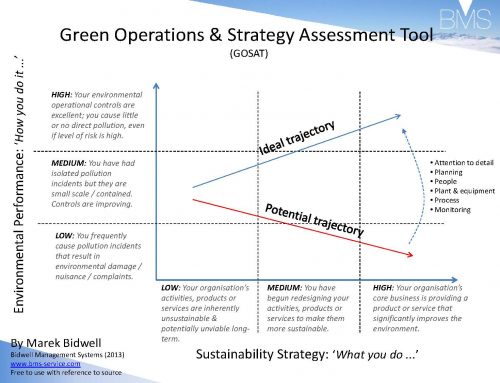Recently reading both ‘Prosperity without Growth’ by Tim Jackson, and ‘The God Species’ by Mark Lynas I have been struck how both authors share a deep concern for the earths global systems, but have reached radically different solutions for global sustainability.
Jackson argues that necessary CO2 reductions can only be achieved by limiting material throughput because otherwise the carbon intensity of each dollar spent must fall to at least 6g CO2 by 2050. He says it is
“entirely fanciful to suppose that deep emission cuts can be achieved without confronting the structure of market economics”.
He also puts forward various evidence that beyond a certain points increased GPD / capita does not improve life expectancy or happiness, and yet we are locked into a never ending cycle of novelty and growth based on the measure of GDP or “busy-ness”. He attempts to deal with the problem of unemployment resulting from degrowth by expanding green jobs a shift to more local sustainable societies.

Lynas makes a strong case for a techno fix to save the earths systems, not just from global warming but also 9 other planetary boundaries or tipping points identified by Rockstrom et al, 2009, Nature, 461. He disregards the degrowth argument as unrealistic (especially for developing countries) and proceeds to ‘jettison some fairly sacred green cows’ arguing for more & better nuclear power, genetic engineering, geo-engineering, and payments for ecosystem services etc… All these solutions are large-scale (Earth System Governance) and leave little for the individual citizen to do other than voting for parties that would implement the changes – a real shock for traditional green activists. There is a sense of urgency in his writing however as 3 of the planetary boundaries have been crossed already. Lynas is clearly not another Lomborg because he passionately believes that world-wide environmental problems are critical; but can be solved.
I would recommend both books and having digested these two arguments feel that as is often the case both authors have valid points and neither should be disregarded. It seems that developed economies have a lot to learn from TJ’s book and it speaks directly into ongoing economic problems; and yet at the same time greens should be much more willing to accept innovative scientific solutions to planetary problems. We probably don’t have time to do one or the other, we need to do both.
A few days after writing the above The Royal Society Report published “People and the Planet” that tackles this debate, and concludes on page 82 that although technology has been vital for aiding human development, and will continue to help avoid some of the impacts of a depleted natural environment, the combined effects of market forces and new technologies are not able to overcome planetary boundaries on the scale necessary to avoid unsustainable pressure on the planet and much human suffering.
By Marek Bidwell (Bidwell Management Systems)
